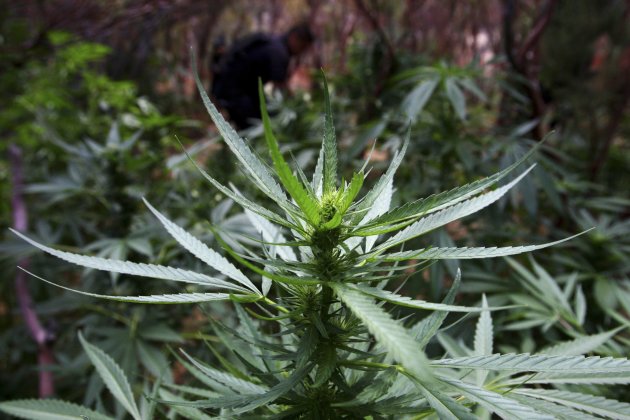By Yasmin Jaswal
A new draft policy paper from the B.C. branch of the Liberal Party
is calling on the government to end prohibition of marijuana in Canada
and is providing answers on job creation and government tax and
licensing revenues should the province go the way of our friends across
the border.
“One economic analysis conducted by the Colorado Center on Law and Policy found that the initiative will generate upwards of $60 million per year in new revenue for the state and localities,” says Mason Tvert, director of communications for The Marijuana Policy Project in Colorado, a lobby group in the state.
Should B.C. follow suit, it's estimated the province could count on an additional $2.5 billion in tax and licensing revenues over a five-year period, according to research from Simon Fraser University cited in the report. The province would also benefit from thousands of new jobs, both directly and indirectly related to the cultivation, distribution, transportation and regulation of marijuana.
The potential economic benefit of legalized marijuana to Canada as a whole is estimated to exceed $4 billion annually, based on three million consumers, the report says.
Canada falling behind?
 Despite the expected padding of provincial and federal coffers and
the potential boost to the labour market, Canada seems to want out of
the pot business altogether.
Despite the expected padding of provincial and federal coffers and
the potential boost to the labour market, Canada seems to want out of
the pot business altogether.A new government proposal states that by March 31, 2014, the Canadian government will stop producing and distributing medical marijuana, and users of the substance will no longer be allowed to grow their own.
According to Health Canada, medical marijuana use in Canada has increased from less than 500 users in 2002 to more than 26,000 users today.
Currently, medical marijuana users must apply annually to obtain authorization to use marijuana. They can also apply for a license to either grow their own marijuana or have another designated individual produce their marijuana for them. The plant seeds must be purchased from the government. One pack of 30 seeds costs $20, plus tax and shipping. A third option is to purchase marijuana directly from the government, which would cost $5 per gram, plus applicable shipping and taxes.
“I produce cannabis for myself for the entire year at a cost to me of less than $200,” says Laurie MacEachern, director of the Medicinal Cannabis Patients' Alliance of Canada. She uses 12 grams of cannabis every day.
Licensed producers will be the only ones allowed to grow and sell marijuana, and they will also determine the new price of the substance, states the Health Canada website about the new proposal. MacEachern fears the costs will be too heavy of a load for some people.
“The average cost under the proposed program is going to be $48,000 a year. Some of us are on a limited income of $12,000 a year or less,” she says. “Who’s going to bear that burden?”
The cost of marijuana is one of the government’s reasons behind its latest proposal. “The current Marihuana Medical Access Program costs Canadian taxpayers millions of dollars each year,” states the Health Canada release.
But the millions medical marijuana is costing Canadian taxpayers pales in comparison to the potential billions in provincial revenue that could be realized through the end of prohibition.
“We do know that in B.C., approximately somewhere between $440 million and $560 million is spent by British Columbians on cannabis every year,” says Dan Werb, co-founder of the International Centre for Science in Drug Policy and member of the Stop the Violence BC coalition, which strives to change marijuana policies to lower gang and drug-related crime in B.C.
According to the latest data from Statistics Canada, more than 108,000 drug crimes were reported across the country, with B.C.’s total for cannabis-related crimes reaching more than 19,000.
“[Cannabis prohibition is] a static, failed response,” says Werb. “And that’s why we’re seeing this proliferation of the cannabis industry and the drug industry more generally across Canada.”
Strong support for Canadian reform
Many Canadians want to see changes surrounding current marijuana laws. A recent poll conducted by Angus Reid on behalf of Stop the Violence BC found 75 per cent of British Columbians support some form of marijuana taxation and regulation.
In a separate national survey, 60 per cent of respondents said they support reform of marijuana laws. British Columbians were the most supportive with 73 per cent in favour of reform, according to Toronto’s Forum Research. The majority of support comes from older Canadians aged 55 to 64.
Opposition remains on both sides of border
There are, however, others who believe marijuana should remain illegal, and some who believe there should be harsher penalties for possessing, producing or selling the drug.
Carla Lowe, founder of Citizens Against Legalizing Marijauna (CALM), a political action group in California, believes legalization can actually cost the economy.
And, as Lowe points out, “federal law trumps state law,” and in the U.S., federal law prohibits taxation of illegal substances, meaning both Colorado and Washington State will need to figure out how their new state laws will coexist with federal prohibition.
As Colorado and Washington State hash out regulatory policies and tax codes, the Canadian government is attempting to wash its hands of the medical marijuana business while Canadian supporters for reform are languishing in the early stages of policy change.

No comments:
Post a Comment